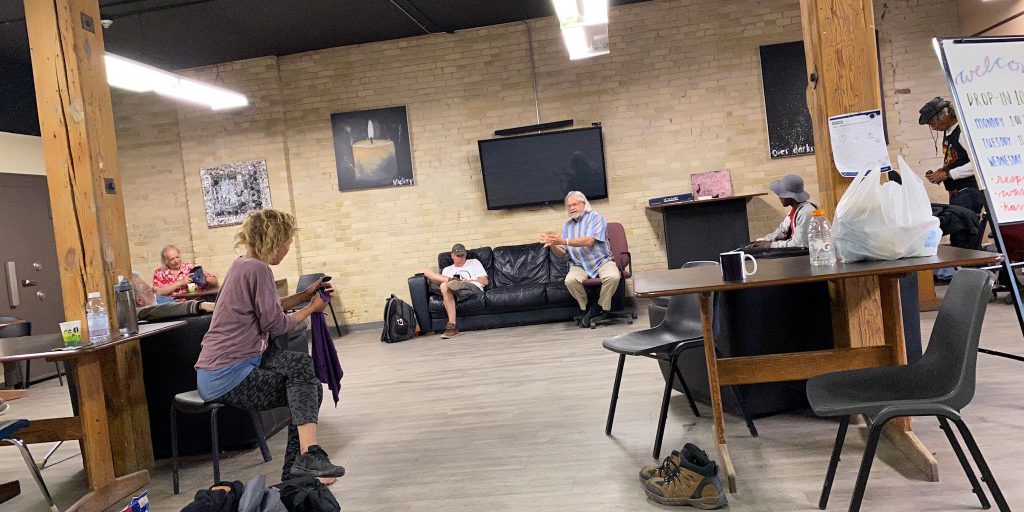Community & Presence (Part 1)

PART 1: Being Present
As a church community, PRESENCE is one of our highest values. Having friends around you, particularly in difficult times is life-giving. More than that, we believe that healthy community is a key to flourishing in life. That is part of the irony of COVID-19; there is health in us being apart – physical health anyway. At the same time, there is no question that mental and emotional health has suffered as we have isolated and distanced from each other.
At One88 Church, we desire to be a church family that creates deliberate space for those who exist at the margins of society. When the news of COVID-19 and the subsequent restrictions hit, we had to consider what it looks like to be the church in our context. BEING TOGETHER is of utmost significance, especially for those who are often alone in life. After conversation with the province, we were fortunate to be deemed an essential service given that we spend much of the week with people who are among the most vulnerable in our city. We have done what we can to remain present with people through this time of social isolation, holding fast to the value the presence brings to our lives. (This has been done in compliance with cleaning, gathering, and distancing regulations from our province.)
I believe it is important to consider what it means to be present with people in any context. Through a series of posts, I want to explore COMMUNITY & PRESENCE with you, thinking about why this is so significant. For churches, this is particularly important as we are well-known to be somewhat fickle with our presence in messy spaces. Churches often come in more project oriented, running a program, kids activities, etc. Yet those projects can lack longevity based on leadership changes or simply the need to do something new. I believe this is a dangerous way of engaging society and damaging to the relevance of the church.

Part One of this thought begins by recognizing that, particularly as it relates to marginalized people, the church’s interaction can be described as charitable, meaning we are inclined to “do for” people rather than “be with” them.
Stanley Hauerwas writes: “I fear we often want to help the poor without getting to know who the poor may be. I suspect we do so not from some ideology against the poor, but we prefer to do for the poor rather than be with the poor because the poor scare the hell out of us.”
Our charitable posture towards poor people lives itself out in two ways. One way is “social” through providing donations, food, dropping off clothes as an act of social responsibility or service. The other way is “evangelical.” Charity opens the door to the opportunity to call people to conversion, an opportunity to share the gospel.
The issue is that when you remove community & presence from either of these interactions, they do very little to change the poor person’s reality. The food, clothing, shelter meets an immediate need but will be a need again tomorrow. And calling to conversion without the deliberate presence of discipleship community may perhaps save a person’s soul for eternity but their life remains a living hell.
Hauerwas argues that “the poor” or “the marginalized” is a category created by those who are deemed successful within society, particularly economically successful. It is a way of excluding and separating those who have achieved a level of success defined by the cultural narrative from those who have not. This categorization excludes and assigns people to the margins of society without any sense of who these people might be. When the church is more inclined to “do for” marginalized people rather than be “present-with” them, it perpetuates this exclusion which is not based on knowing or being with a person but on cultural assumptions of worth and value.
The church community needs to be a place where all people, marginalized included, find friendship. I agree with Samuel Wells in saying that “the poor” is not merely a socio-economic definition but refers to a people who have no idea what to do to change their lives and have no one with whom to do it. Not primarily economically poor but socially, community poor. This is a far more significant reality in my opinion. In a world that has no patience for them, the church needs to patiently listen to stories and hear their journey. In doing this, the community both pours value into people’s lives and is best able to know how to move forward together.
So it is not about engaging in transactions in which we provide charitable goods & services but about building friendship. The church befriends marginalized people in the name of the God who befriended all people. Being “present-with” marginalized people is part of the church’s faithfulness as a reflection of God’s nature.
